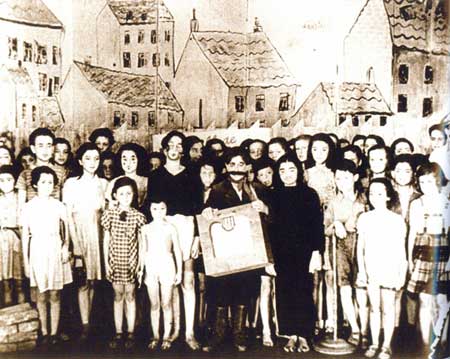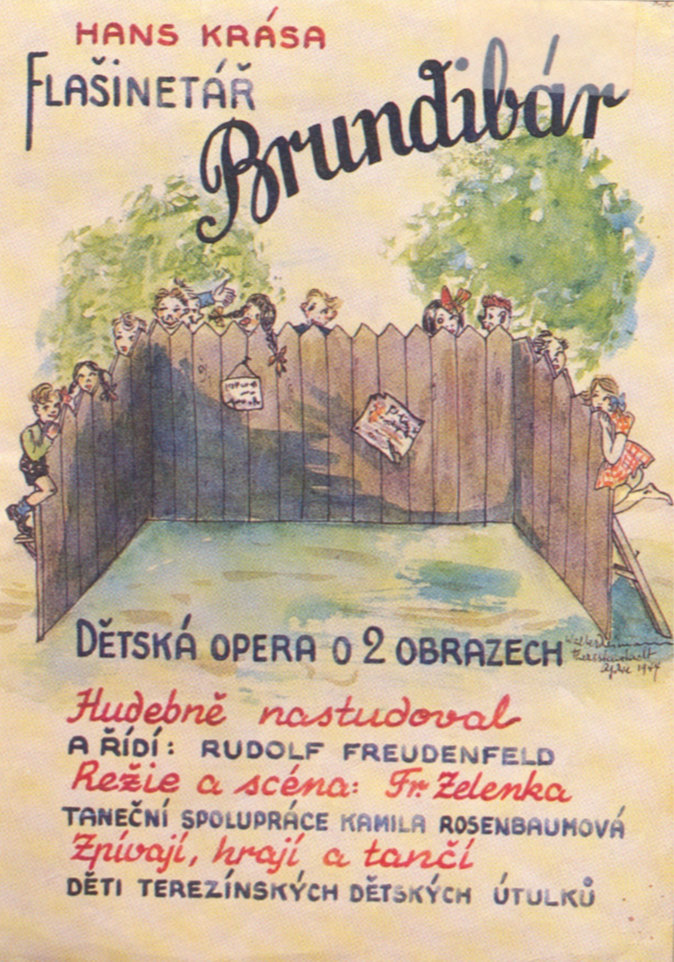
The children’s opera Brundibár is well known because of its extraordinary provenance. Written in 1938, it was subsequently performed 55 times by the Jewish inmates of the Thereseinstadt Nazi concentration camp, which was designated as a “model ghetto” by the Nazis. During the three and a half years of its existence, around 140,000 people were brought to Theresienstadt from Czechoslovakia, Germany, Austria, the Netherlands, Denmark, Slovakia and other countries.
The Nazis tried to conceal Theresienstadt’s function as a way station on the road to death from the eyes of the international public and presented it as an idyllic place to live. They even supported different cultural activities for the Jewish artists, musicians and writers imprisoned there. A number of operas were performed including Tosca, Aida, Carmen, La Boheme and Die Fledermaus – some in a concert version with piano and some fully staged with orchestra.
Children’s opera Brundibár
is an exceptional World War II cultural phenomenon
Brundibár by Hans Krása with lyrics by Adolf Hoffmeister became the most famous theatre production of Theresienstadt. Depicting the victory of children over the tyrannical organ-grinder Brundibár, the opera symbolized the triumph of good over evil, served as a form of resistance and gave the inmates of the camp hope for liberation. The opera’s final scene was later captured in the Nazi propaganda film Theresienstadt, better known under the deceptive title Der Fuhrer schenkt den Juden eine Stadt/The Fuhrer Gives the Jews a City. In the autumn of 1944, as soon as filming was finished, the composer Hans Krása, conductor Rafael Schachter, director and stage designer František Zelenka, members of the orchestra, and young actors were shipped in cattle wagons to Auschwitz. The deportation of the artists silenced the most popular theatre production in Terezin.
After World War II, Brundibár gained worldwide fame and has become an artistic symbol of resistance to authoritarian regimes, genocide, war crimes, and crimes against humanity. Thanks to the efforts of the violinist and conductor Joza Karas, Brundibár was introduced to the English-speaking world in 1977. German premiere took place in 1985. After the Opera de Paris’ production in 1997, Brundibár is widely performed in France. Countless productions of Brundibár in Czech, German, English and French highlight an exceptional place for Brundibár in the musical repertoire, serving as an appeal for solidarity and resistance against tyranny.
To mark the 70th anniversary of the end of World War II
and 100th anniversary of the Armenian Genocide,
Brundibár was staged in Russian

2015
Production at the Volgograd Music Theatre
Production at the Moscow Philharmonic
2016
Production at the Hermitage Theatre and Mikhailovsky Theatre
in Saint-Petersburg
Production at the Mariinsky Theatre in Vladikavkaz
2017
Production at the Mariinsky Theatre in Saint-Petersburg
Production at the Sakhailin Chekhov International Theatre Center
2018
Mariinsky Theatre marked the 75th anniversary of the historical
production of Brundibár (1943)
2019
Production at the Tallinn Russian Theatre (Estonia)
A Russian translation of Brundibár is created by the famous poet Lilia Vinogradova, also known for her collaboration with Dmitri Hvorostovsky, Anna Netrebko, Andrea Bocelli, Lara Fabian, Yusif Eyvazov, Sumi Jo and others. Lilia Vinogradova managed to create a Russian vocal text for Brundibár, close to the original Czech melody, which meets both the needs of the children’s audience and the most demanding artistic requirements. Her translation has the status of the official Russian libretto of the children’s opera Brundibár by Hans Krása.
Brundibár in Russian is staged by Mstislav Pentkowsky, one of the leading stage directors of his generation. His other engagements include Britten’s Young Audience Guide to the Orchestra, Frid’s Diary of Anne Frank and Prokofiev’s Peter and the Wolf at the Mariinsky Theatre; Thaikovsky’s Eugine Onegin at the Boris Pokrovsky Moscow Chamber Music Theatre; Tchaikovsky’s Queen of Spades at the Moscow Philharmonic; Stravinsky’s Rake’s progress and Ananiev’s Squaring the Circle at the Open Stage Moscow Theatre; Bach’s St. John Passion at the Moscow Conservatoire. In 2016, Mstislav Pentkowsky won the Young Opera Directors Competition at the Mariinsky Theatre.
The first performers and eyewitnesses of Brundibár in Theresienstadt – former young inmates Ela Weissberger (USA), Evelina Merova (USSR – Czech Republic) and Inge Auerbacher (USA) as well as the well-known journalist and public figure Vladimir Pozner – were directly involved in the Mariinsky Theatre performances in Saint-Petersburg and Vladikavkaz. Their fate and their own story of resistance to authoritarianism made an indelible impression on the huge audience.

